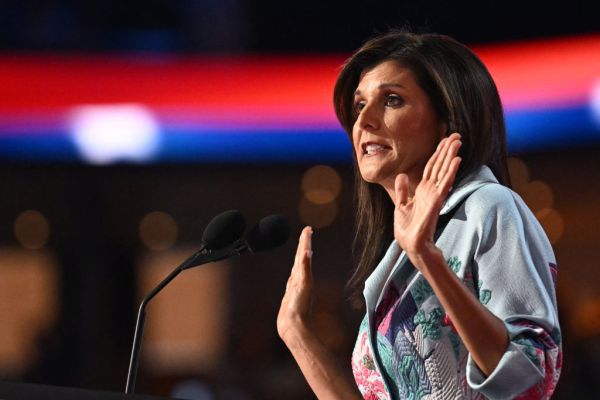Who said it?
“Kamala Harris is a radical liberal who would raise taxes, take away guns & health insurance, and explode the size and power of the federal gov’t. She wants to recreate America in the image of what’s happening on the streets of Portland & Seattle. We won’t give her the chance.”
No, it’s not Donald Trump. The words are properly spelled and capitalized, aren’t they?
It’s not J.D. Vance either. He would have thrown something in about foreign parasites sucking the blood out of American communities (and out of their pets, specifically).
It’s Liz Cheney. She tweeted the above on August 11, 2020, the day Joe Biden chose Harris as his running mate. Her post circulated again on Thursday morning as she prepared for a joint appearance in Wisconsin with the candidate she’s supporting this year: Kamala Harris.
How you feel about that tweet depends on how you view the choice next month.
If you’re treating the election as a competition of policy visions, Cheney’s post is evidence of hypocrisy so ludicrous that it should neutralize whatever influence her endorsement might carry with conservatives. Four years ago she claimed Harris was too liberal to be trusted with power; four years later she’s campaigning with her against a Republican. She’s free to be a progressive if she likes, but no right-winger who cares about policy should take her seriously ever again.
If you’re treating the election as a competition of civic visions, Cheney’s position then and her position now are consistent. Her old post bolsters the case for the Democrat today, in fact: If someone with as many misgivings about Harris’ policy agenda as Cheney had in 2020 is willing to lay them aside to support her in 2024, the civic threat posed by the Republican ticket must be truly dire.
And it is truly dire, as Cheney discovered belatedly after the last election and as we were all reminded again on Wednesday.
As rumors swirled last night that she would campaign with Harris today, one Dispatch colleague asked when was the last time a prominent Democrat put “country over party” by endorsing the opposition’s candidate, as Cheney is asking Republicans to do this year. Names were tossed around—Zell Miller? Joe Lieberman?—but I think the answer to that question is a question. When was the last time Democrats nominated someone so plainly menacing to the civic order as to make a right-wing “country over party” appeal to liberals compelling?
The correct way to view Cheney’s appearance with Harris, I think, is as part of a tug-of-war of sorts with a fellow Reagan Republican who cosplayed as a serious critic of Donald Trump in this year’s GOP primary. Cheney is tugging conservatives toward believing that the Republican Party has become unsalvageable and deserves to lose; Nikki Haley is pulling them toward believing that it isn’t and doesn’t, especially if it has the good sense to give her a shot at leading it someday.
It’s “the full Liz” versus “the half Liz.”
Burning bridges.
Harris and Cheney are in Ripon, Wisconsin, where the Republican Party was founded in 1854. The symbolism is obvious, although I think its meaning is slightly different for the two.
For Harris, having Cheney with her at the birthplace of the GOP is a bid to create a “permission structure” for conservatives to cross over and vote Democratic this fall. Cheney’s longtime partisan allegiance is important to that pitch: So long as she claims to represent the spirit of the true Republican Party against the usurper Trump, Reaganites who are reluctant to vote for him can reassure themselves they’re not betraying their political “tribe” by backing Harris.
For Cheney, I suspect, there’s an additional dimension to the symbolism.
One of the arguments Never Trumpers often make for voting Democratic this year is that only a Trump defeat can break populism’s spell over the Republican Party. She doesn’t seem to share that optimism, though. Her visit to Ripon to endorse the other side’s candidate feels like the last rites for a political party that’s no longer worthy of conservatives’ support. She’s laying it to rest in the city where it was born.
It was just a few weeks ago that she wondered whether the GOP has been so hollowed out by Trump’s influence that nothing short of starting fresh will do. “It’s hard for me to see how the Republican Party, given what it has done, can make the argument convincingly or credibly that people ought to vote for Republican candidates until it really recognizes what it’s done,” she told an audience in Wisconsin last month. When her host asked whether the solution might be to start a new party, she replied, “It may well be.”
Notably, she framed her core objections to the GOP as moral and civic more so than policy-focused. People “want a president that kids can look up to” and who will “defend the peaceful transfer of power,” she said. “That’s where we have to start, whether it’s organizing a new party.” She didn’t use the word “unsalvageable” but someone who got trounced in a GOP House primary for the sin of holding a demagogue accountable for a coup attempt doesn’t need to.
Cheney’s appearance with Harris in Ripon and her comments about a new party amount to what I call “the full Liz.”
I defined the term in a newsletter back in January in the thick of the Republican primary, contrasting her approach to Trump with Nikki Haley’s. “By ‘the full Liz’ I mean a frontal assault on Trump’s fitness for office, largely dispensing with arguments over policy differences,” I wrote. “Cheney has sharp disagreements with Trump on foreign policy, for instance, but those have become an afterthought to her core critique that he’s unbalanced and an authoritarian threat to American democracy.”
Trump is shockingly unfit for office, both morally and civically, and never more so than after January 6. That’s all you should need to know to justify supporting his opponent. That’s “the full Liz.”
Haley wouldn’t go there. During the primary she practiced what I described as “the half Liz,” attacking Trump’s fitness without ever quite daring to disqualify him on moral or civic grounds as Cheney does. Trump is too old; Trump is undisciplined; Trump is responsible for most of his own political problems. Those were Nikki Haley’s critiques, and they went further than most Republicans are willing to go in questioning their leader. Just not so far as to make you think that Haley believed Trump was less qualified than the Democratic alternative.
What Haley calculated, correctly, is that Republican primary voters would tolerate “the half Liz” from one of their candidates but not “the full Liz.” To call Trump morally or civically unfit is to affirm the Democratic critique of him. That’s high treason, unforgivable, and it’s why Cheney has become a pariah. But to call Trump tactically foolish, as Haley did, is acceptable because it aims to help him and the party by fixing a fixable mistake. “The half Liz” is compatible with wanting Trump and the GOP to win. “The full Liz” is not.
No wonder Cheney and Haley ended up where they did once the primary ended, the latter endorsing Trump and the former endorsing Harris. You don’t practice “the full Liz” unless you regard a second Trump presidency as a threat so sinister that you’re willing to durably alienate the American right for the sake of trying to prevent it. After appearing with the Democratic nominee on the trail, there’s no longer any scenario in which Liz Cheney will be welcomed back into a post-Trump GOP, even one that ends up eager to reform. Her affront to tribalism is too grave.
By insisting on treating this race as a contest of civic rather than policy visions, she’s burned what’s left of her bridges and written off her party forever. Go figure that she’s prone to fantasizing about starting something new.
Nikki Haley, on the other hand …
A bridge to nowhere.
In January’s newsletter I argued that “the half Liz” was a sensible primary strategy for a Reaganite like Haley who needed to challenge Trump’s fitness without challenging it so much as to offend Republican voters. She had a difficult hand and she was playing it as best she could.
But there was a catch.
“The obvious problem with the half Liz strategy is that it offers no reason not to prefer Trump in November as the least bad option available,” I wrote. Because it stops short of disqualifying him from office, it allows Republicans to believe that he’s too old and undisciplined to be the optimal GOP nominee yet still better for the country as president than Joe Biden or Kamala Harris.
Unlike in the primary, where “the full Liz” and “the half Liz” shared the goal of defeating Trump, the two are now pitted against each other in what they hope to achieve. “Unless it eventually progresses to the full Liz, the half Liz is ultimately just a ‘permission structure’ to vote MAGA in the general election, albeit a bit more grudgingly than you otherwise might have,” I noted in January. And that’s been borne out: As Liz Cheney strains to convince conservatives and right-leaning independents that it’s okay to vote for Harris, Nikki Haley is on the radio implying that no, it’s really not.
On Thursday SiriusXM circulated a transcript from her new show. We’re 33 days out from Election Day, nearly seven months after she quit the race, and she’s still practicing “the half Liz.” Quote:
“You know, the biggest takeaway that I have, that I've watched the whole time is that he's still campaigning like he's in a primary. That's the one thing I wish I could just shake him and say, stop. He needs to shift to a general. He's talking a lot of primary talking points. … And J.D. was doing that for a while. J.D. showed the shift last night. Now Trump needs to show that shift. … Quit talking about the red meat stuff. You are only talking to suburban women. Independents. That is, it is less than a million people will decide this. That 5 percent of people, talk to them. Tell them, and guess what? Tone matters. … Because suburban women care about what their kids see. And they want someone that they can show their kids, ‘That's our president.’… Yeah, he can be a likable guy, but when you put him out there to rally or you put him, you know, and stop calling her ‘Dumb.’ Stop saying she's got mental problems, like all that stuff. No one likes that. And actually take a playbook from your VP last night.”
Everything there, even the Cheney-esque bit about children wanting a president to be proud of, is carefully framed as a strategic or tactical critique rather than a moral or civic one. It’s bad that Trump is running the most demagogic campaign in modern American history—but only because it risks alienating independents and suburban moms.
“The half Liz” wants Trump to win but fears that his behavior is undermining that important goal. “The full Liz” wants Trump to lose because it doesn’t want America governed by a proto-fascist sewer rat. That’s the difference.
“MAGA very much was, you know, people were tired of government. They were tired of government intrusion, they were tired of government being slowed. They didn't trust government. It was just, they wanted to see the red tape out of the way and you know, all of these things. And so the MAGA movement was born with the help of Donald Trump. A lot of Americans wanted to see the change that Donald Trump brought in. But what you're seeing is the MAGA movement's doing what the Tea Party did. It's starting to fringe out, and they're caring about these one-off issues that wasn't something that was thought about. That's not all of MAGA, but you're seeing it kind of fringe out. And what's concerning is you're seeing certain MAGA people not like other Republicans. And so MAGA doesn't like moderate Republicans. They don't necessarily talk about Independents. And the biggest thing I'll say, especially going into a presidential election, I would remind MAGA, you need everybody. You need those RINOs you talk about. You need suburban women. You need Independents. You need people who don't necessarily think like you because that's how you win an election.”
Again, the idea that Trump’s movement is “starting to fringe out” (starting?) is presented not as something that should concern conservatives on the merits but as politically inconvenient because it’s off-putting to swing voters. Inescapably, you’re left to wonder how “the half Liz” will cope if Trump’s grotesque apocalyptic rhetoric turns out enough low-propensity voters next month for him to prevail. If you can prove to Nikki Haley that calling Haitians dog-eating savages and Kamala Harris mentally disabled are an electoral winner, will she drop her objections to that sort of rhetoric?
A clue as to why Haley persists in this nonsense comes at the start of the last quote. It is, uh, not correct that MAGA rallied to Donald Trump in 2016 because they were “tired of government” and “government intrusion.” Quite the opposite: Populists love Trump because, unlike Reaganite eggheads, he’s less interested in shrinking government than in harnessing its power to persecute their cultural enemies. They’re not tired of government, they’re tired of government not hurting the right people.
But this is the sort of retconned nonsense an ambitious conservative like Haley needs to indulge in to keep alive the dream that a post-Trump GOP might turn for leadership to someone like, well, her. You can imagine her in 2028 pushing this revisionist claptrap on the primary campaign trail, trying to convince Trump voters that supporting her is the logical next step of Trumpism because, after all, she’s as “tired of government” as they are.
Or maybe the claptrap is her way of trying to delude herself that the party to which she’s pledged her eternal loyalty, no matter how lousy it gets, still basically shares her conservative politics. Reaganites are tired of government and MAGA populists are … also “tired of government”? Sort of?
“The half Liz” desperately wants to remain a part of the right-wing tribe. “The full Liz” couldn’t care less or is insulted by the prospect.
There’s an irony to Haley’s pandering, though. If in fact she’s eschewed “the full Liz” as a matter of ambition, because she hopes to be a national player in the GOP after Trump is gone, “the half Liz” approach she’s taken instead might inadvertently make that impossible.
After all, Haley could win her tug-of-war with Cheney. As Liz goes about tugging conservatives toward Harris, granting them “permission” to vote Democratic this time, Nikki is tugging them back toward Trump by granting them “permission” to stay put. She’s even offered to campaign for him to try to stymie Cheney’s efforts to flip Republicans who voted against him in the primary.
If Haley prevails and Trump is reelected, it is very hard to believe that the GOP will turn to a traditional conservative to succeed him as nominee in 2028. Why should it? Populism will have won two presidential elections in three tries and nearly won the third. It won’t matter that Nikki Haley is more “electable” on paper than Donald Trump or J.D. Vance once the Trump-Vance ticket has proven to be electable enough. There’ll be no need for the right to change course. Having J.D. or Tucker Carlson as nominee will do.
Essentially, then, Haley is letting Liz Cheney do her dirty work for her. If “the full Liz” wins the tug-of-war then Trump will lose the election, the GOP will be chastened afterward (potentially), and Haley will be well positioned for 2028. But she won’t lend a hand; for the sake of her viability within the party, she needs to remain the conservative woman who didn’t campaign for Harris. Not only will she not join the effort to protect her country from a civic emergency, in fact, she’s actively undermining that effort in a 50-50 race by urging “Haley Republicans” to stick with the team.
She doesn’t deserve to be president. It’s a consolation that she won’t be.







Please note that we at The Dispatch hold ourselves, our work, and our commenters to a higher standard than other places on the internet. We welcome comments that foster genuine debate or discussion—including comments critical of us or our work—but responses that include ad hominem attacks on fellow Dispatch members or are intended to stoke fear and anger may be moderated.
With your membership, you only have the ability to comment on The Morning Dispatch articles. Consider upgrading to join the conversation everywhere.